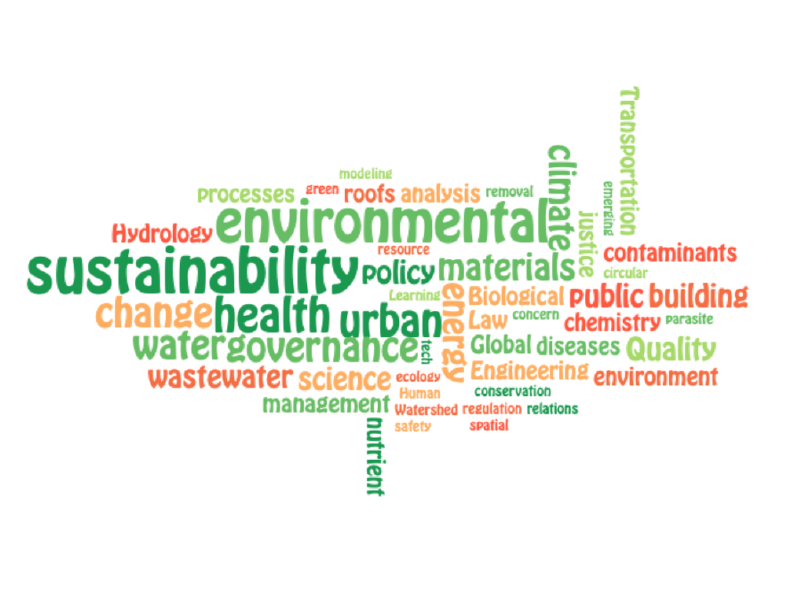Admissions
EnSciMan Program Information Session for 2024 Applicants
If you are interested in learning more about the Environmental Applied Science and Management MASc programs, please register for our next Program Information session on April 15th at 11:00AM. Register here. (external link)
Graduates with an honours degree from a recognized university in any of the environmentally related disciplines and that have achieved a minimum grade point average (GPA) or equivalent of 3.00/4.33 (B) in the last two years of the undergraduate four-year degree may submit an application to the Yeates School of Graduate Studies Admissions (opens in new window) . Holders of non-environmentally related degrees will be considered on an individual basis.
MASc applicants are required to have at least one one-term statistics degree credit in their undergraduate degree program. A one-term course normally is four months' long and has a total of 36 to 40 hours of classes in a term. Applicants who do not have any statistics course credit may submit a master’s program application provided the minimum academic requirements to apply stated above are met. Candidates who are offered admission without the statistics degree credit will be required to complete this requirement preferably prior to the first term of study in the master’s program or during the first year of study after admission. Any degree credit statistics course completed at the Chang School (Continuing Education Division of Toronto Metropolitan University (opens in new window) (C.E.) or at any Canadian universities is acceptable. Graduate students enrol in C.E. courses will be responsible for paying the C.E. course fee in addition to the graduate program fees.
Two letters of academic recommendation are required for each master’s full- and part-time application. Master's part-time applicants who are working in an environmentally related field and that are unable to provide two academic references may submit a professional letter to replace one of the two academic references. At least one academic reference must be provided.
Applicants must contact professors to discuss research supervision opportunities before applying. These professors must be faculty members affiliated to this program. Refer to the list of Faculty Members (opens in new window) online.
Candidates who are holders of a master’s degree in an environmentally related discipline and have achieved a minimum grade point average (GPA) or equivalent of 3.33/4.33 (B+) in the master’s program may submit an application to the Yeates School of Graduate Studies Admissions. Master’s degree holders in other academic disciplines will be considered on an individual basis.
Three letters of recommendation are required from academic referees who can judge the candidate's potential to engage in research at the doctoral level. Candidates are also required to demonstrate research potential in the way of a master's thesis or research project indicated in the academic transcript or in a publication that has appeared in a refereed journal or conference proceeding. Applications that don't demonstrate research experience may not be considered for admission.
Applicants must contact professors to discuss research supervision opportunities before applying. These professors must be faculty members affiliated to this program. Refer to the list of Faculty Members (opens in new window) online.
All graduate applications are submitted online. Detailed instructions are available on the graduate admissions website.
STEPS |
INSTRUCTIONS |
Step 1 |
|
Step 2 |
Submit an application through the Ontario Universities' Application Centre (OUAC) website (instructions) |
Step 3 |
Within three business days, you will receive your Toronto Metropolitan University Applicant ID number, a my.torontomu.ca login and a password. Login to the Applicant Upload Portal and upload your documents. |
Step 4 |
|
Step 5 |
Monitor the status of your application through your student centre in RAMSS and through the Applicant Upload portal. |
Application Process and Timelines
For application deadlines, please go to https://www.torontomu.ca/graduate/future-students/apply/application-deadlines/
The application process is managed through the Toronto Metropolitan University application portal. Answers to common questions, such as deadline to apply and proof of English proficiency requirements, are provided in the Graduate Studies Admissions "How to Apply (opens in new window) " web site. Other application and admission related information is available in the Frequently Asked Questions (FAQ) section of "How to Apply". If at any point during the admissions process you have a question or need assistance, email grdadmit@torontomu.ca.
Applications that the Graduate Admissions Office deems meet the minimum academic requirements to apply will be made available to the Environmental Applied Science and Management Program Admission Committee for assessment. Incomplete applications will not be processed by the admissions office or reviewed by the Program Admission Committee. Please refer to “Apply Online (opens in new window) ” for information about monitoring your application documents in RAMSS.
Typically, we will close domestic applications on December 1st for winter intake, April 1st for spring/summer intake, and August 1st for fall intake.

“There were so many people [in the program] who supported me and allowed this to happen. Both of my supervisors, were incredibly supportive and creative. ”
Application Checklist
Incomplete applications will not be reviewed by the Admissions Committee. See Graduate Studies: Required Documents
A standard graduate program application comprises of:
- an Application Submission Summary
- a Statement of Interest
- a Resume/CV
- Letters of Recommendation
- Transcripts, and
- proof of English Language Proficiency,where applicable.
Information outlined below is additional program-specific.
The Statement of Interest is part of the “Required Documents” of your application. Refer to steps 3-4 in "Apply Online" in the Graduate Studies Admissions web site for the online submission information.
Formatting guidelines for the Statement of Interest
- In the top right corner in each page indicate your full name and the program code you are applying;
- Program Codes: AM001 (master’s full-time); AM002 (master’s part-time); AM003 (PhD). For example, if John Smith is applying for master’s full-time study, "John Smith, AM001" should be appearing in the top right corner of each page of the statement.
- All text must be in 10 point or larger;
- Set the margins of each page at a minimum of 0.5 inches,
- Each Statement must include Part A Potential Faculty Supervisors and Part B Statement of Interest.
Indicate “Part A Potential Faculty Supervisors” as the heading of this section.
Provide the names of the professors with whom you would like to study and conduct graduate research under their supervision. Applicants must contact professors to discuss research supervision opportunities before applying. These professors must be faculty members affiliated to this program. Refer to the list of Faculty Members (opens in new window) online. Up to a maximum of five names may be provided.
"Indicate “Part B Statement of Interest” as the heading of this section. Master’s applicants indicate “Master’s Thesis Option” or “Master’s Project Option” in the heading.
Statistics: provide the year and the university statistics course code/title that you have completed or will be completed. Or indicate "No statistics credits in the university transcript(s)" .
Key words: provide up to 5 single words and/or brief phrases that summarize the key areas of graduate research you are interested in pursuing.
Part B of the statement should be no more than 1,000 words in length.
The statement should address the following:
- reasons for studying in this graduate program;
- expend on the key research areas you are interested in pursuing in a master's thesis, master's project or in the doctoral dissertation;
- how your previous studies and experience have prepared you to study and to conduct scholarly research in this program; and
- your career objectives and how this degree program relates to them.
Recommendations MUST be provided by the applicant’s former professors or research supervisors who are familiar with the applicants’ abilities in graduate study and scholarly research.
- Master’s Applications: TWO academic recommendations are required for each master’s full- and part-time application. Master's Part-time applicants who are working in an environmentally related field and are unable to provide two academic references may submit a professional letter to replace one of the two academic references. At least one academic reference must be provided.
- PhD Applications: THREE academic recommendations are required for each doctoral application.
Additional information about the Letters of Recommendation and submission is available in the Graduate Studies Admissions "Required Documents" web site.
If your referees come across any technical issues about submitting the Letters of Recommendation online, please contact the Graduate Studies Admissions for assistance gradreference@torontomu.ca. You may monitor the status of your application documents online; refer to step 5 of the Apply Online web site.
Highlight on Student Research
Amber Grant, PhD Candidate, Environmental Applied Science and Management.
Amber's research responds to growing evidence and concern that social and environmental benefits of urban trees are inequitably distributed across society and space. Her research explores how environmental justice goals are being defined, pursued, and implemented in urban forest management plans and community tree-planting practice in Canada and the US.
Keywords: urban forest management, environmental justice, sustainability, equity, city trees, community tree-planting
Julie Robertson, PhD Candidate, Environmental Applied Science and Management
Julie's research focuses on the impact of Covid-19 in Nunavut. It is a case study in Arviat as the community accounts for 88% of all Covid cases in the territory to date.
Keywords: Covid-19 , food insecurity, Inuit, Canadian Arctic
